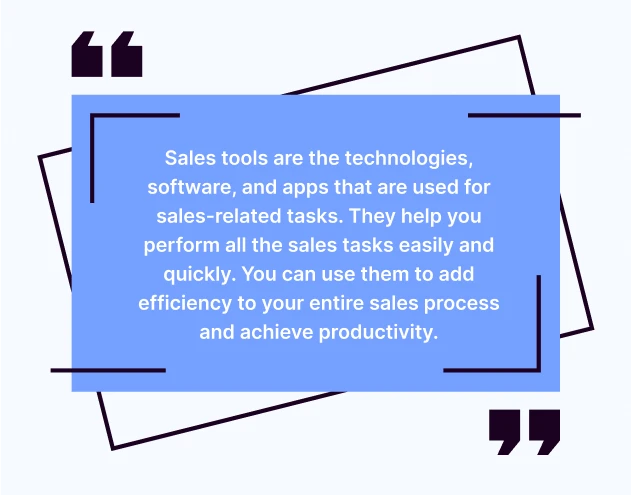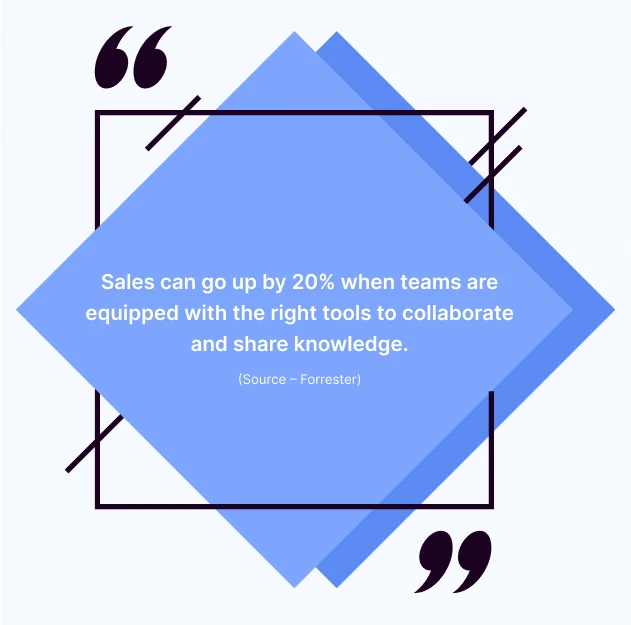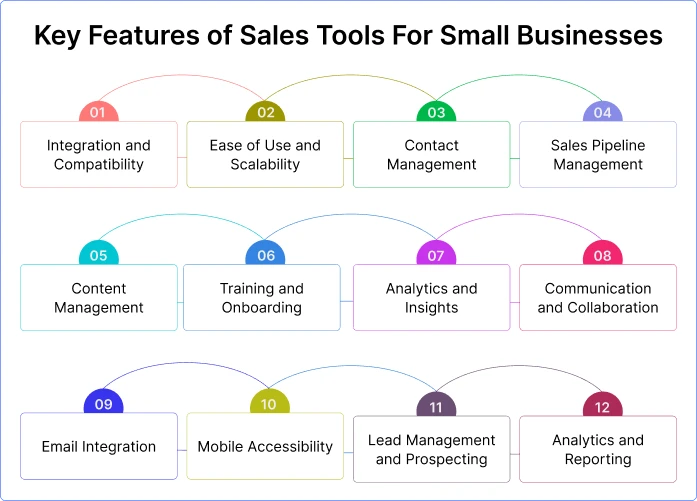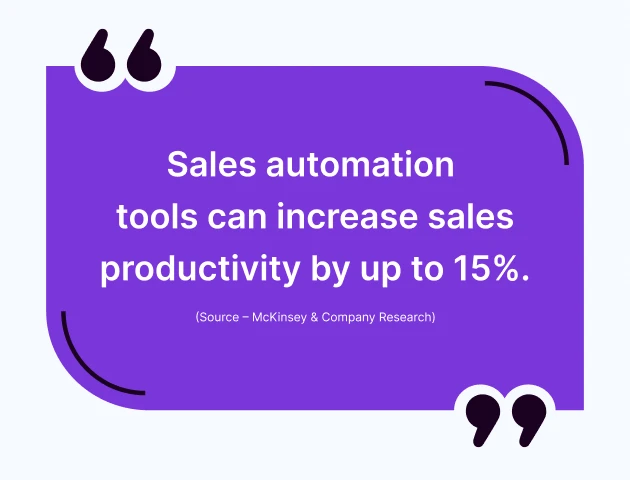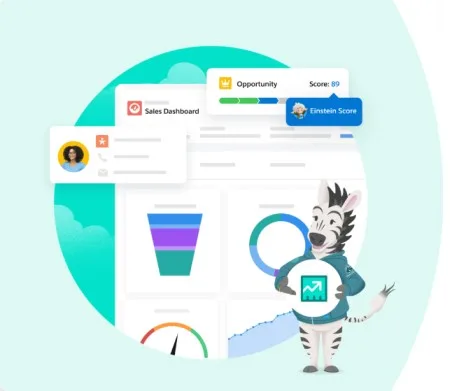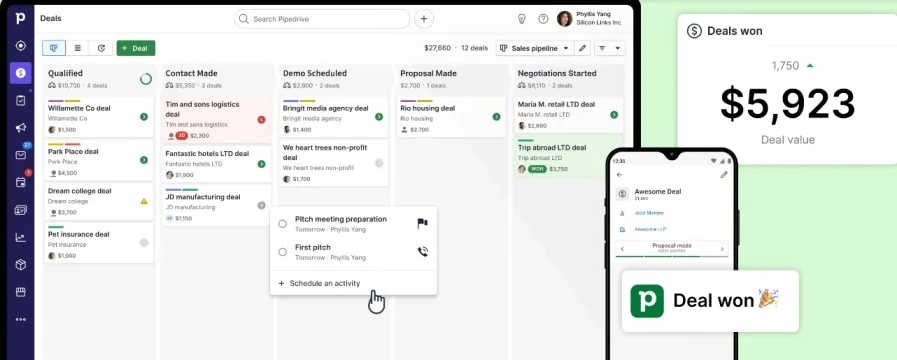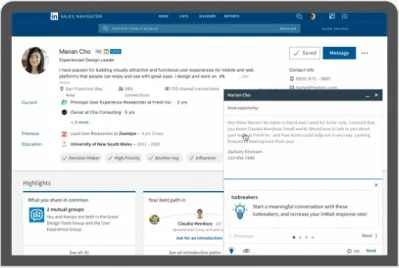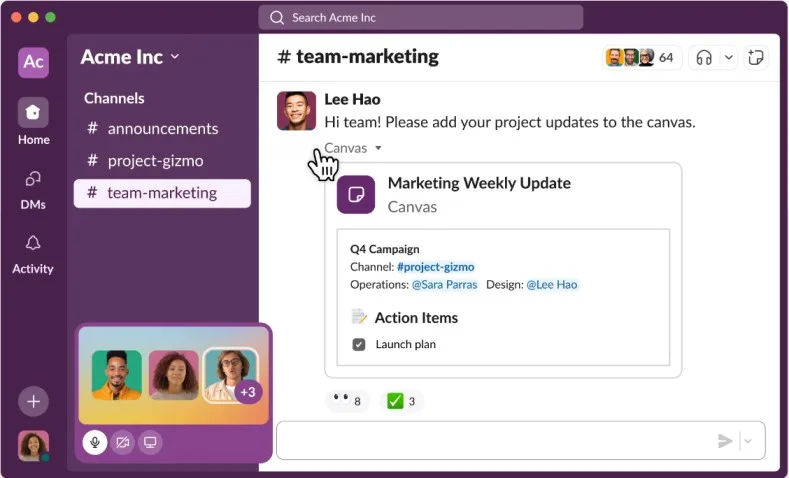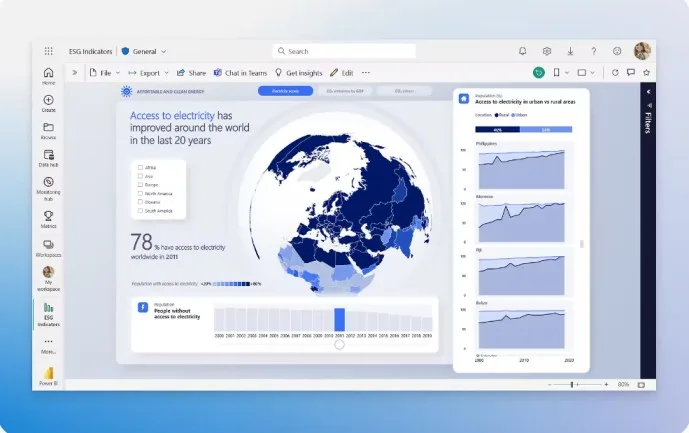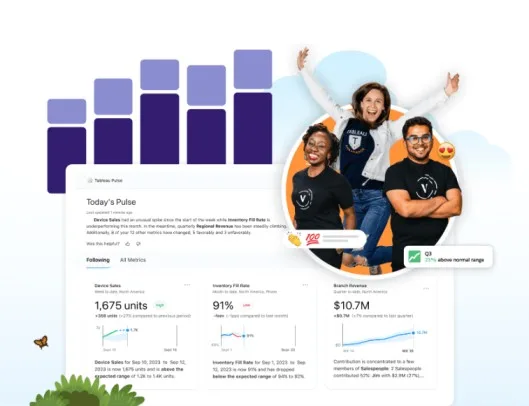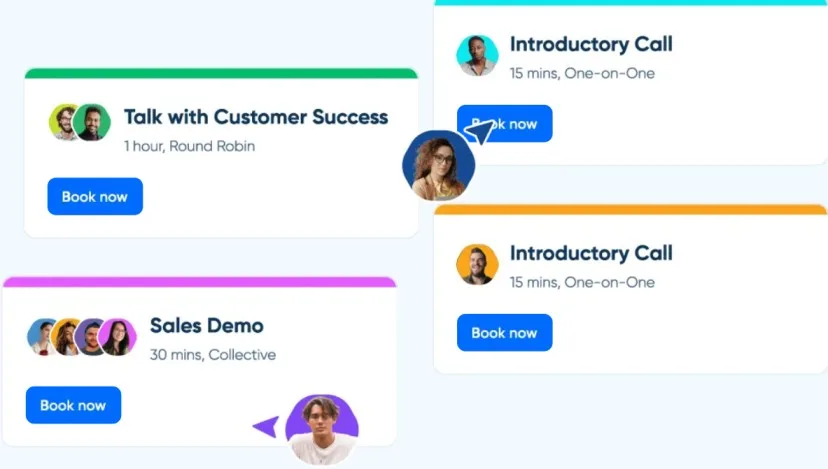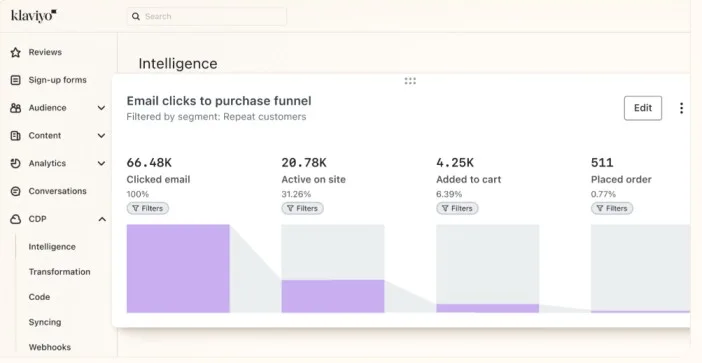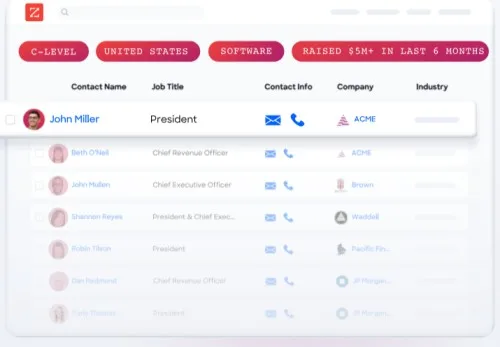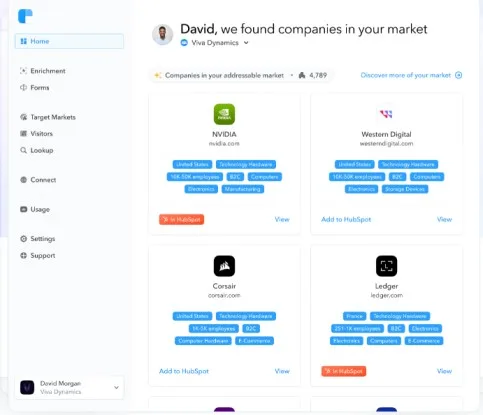8 Types of Sales Tools Your Business Should Be Using Now
- April 4, 2024
- 16 mins read
- Listen

Table of Content
When you run a business, you aim to sell your products and services to customers. The more you sell, the better it will reflect in your revenue. However, sales are not easy even though it may feel otherwise. There are plenty of processes and steps that need to fall into place for sales to happen. That’s why your business needs sales tools to ease its way through all the processes and ultimately sell more.
The good thing is you can find different categories and types of tools for sales and accomplish varying sales-related tasks. Based on your business type and needs, your sales team can use specific tools and achieve efficiency with sales-driven processes. Whether you want to manage the workflows or strategize processes, handle customer relationships, or leverage analytics, there are tools for everything related to sales.
In this blog, we will discuss the best tools for sales, learn the definitions, and explore the benefits and features of different categories of tools for selling.
But before moving further, let’s first understand what those tools are…
What are Sales Tools?
Sales tools are the technologies, software, and apps that are used for sales-related tasks. They help you perform all the sales tasks easily and quickly. You can use them to add efficiency to your entire sales process and achieve productivity.
Since it’s an umbrella term, these tools can include different digital technologies, including sales communication, customer relationship management (CRM), sales intelligence, sales analytics, sales prospecting, sales acceleration, and more.
These tools are not meant for sales only; rather, they can support every activity leading up to sales. Using these tools, a business can streamline customer data, make communication instant, and manage the workflows smoothly, resulting in more chances of sales.
Why Does Your Business Need Tools For Sales?
An empowered sales team is always good for the health of a business. Such teams are created only when you invest in the right sales tools and technologies. These tools can add value to various aspects of sales and that’s why they are used to boost the overall efficiency of your online sales process.
Here are some of the reasons your business needs tools for sales –
- To Increase Efficiency of Sales Teams – Many sales tasks are repetitive and need automation. Sales teams can use the right tools to cut back manual work, stay more efficient, and focus more on high-value activities.
- To Streamline Workflows and Prioritize Tasks – Using tools for sales can help streamline workflows and prioritize tasks. They also enable collaboration, resulting in improved overall productivity levels.
- To Enhance Sales Performance – Getting valuable insights and data is key to understanding customers and their needs better. It also helps in identifying opportunities for growth and improvement. All this results in improved sales performance.
- To Make Data-Driven Decisions – Tools for sales can help in tracking key performance indicators (KPIs) to analyze customer behavior. They are also useful for evaluating market trends and optimizing existing sales processes. The valuable analytics they provide form the basis of data-driven decisions.
- To Provide Personalized Experiences to Customers – Keeping track of customer interactions and communication is easier when the sales team uses the right tools. Based on that, more personalized experiences can be offered, resulting in long-lasting customer relationships.
Key Features of Sales Tools For Small Businesses
Not all tools are created equal for sales. The key is to choose the one that aligns well with your business’s sales, marketing, and customer service goals. Since these tools can support different tasks and processes, analyzing their features can help you find the best from the category. These features can help if you want to know how to choose sales tools for your business.
Here are some of the key features to look for in sales tools for small businesses –
- Integration and Compatibility
- Ease of Use and Scalability
- Contact Management
- Sales Pipeline Management
- Content Management
- Training and Onboarding
- Analytics and Insights
- Communication and Collaboration
- Email Integration
- Mobile Accessibility
- Lead Management and Prospecting
- Analytics and Reporting
Key Stats on Tools For Sales
Not sure how to choose sales tools for your business? Worry not as the below stats will help you understand the various ways in which these tools can help you. They may be termed “sales tools” but their impact extends to more areas than you imagine.
Let’s look at key stats on tools for selling –
- Sales automation tools can increase sales productivity by up to 15%. ( Source – McKinsey & Company Research )
- Sales can go up by 20% when workers are equipped with the right tools to collaborate and share knowledge. ( Source – Forrester )
- Sales analytic tools are important because 58% of companies that use data to make decisions are more likely to exceed their revenue targets than others. ( Source – Salesforce )
- Sales teams that utilize sales enablement platforms achieve 61% higher team quota attainment. ( Source – CSO Insights )
8 Types of Sales Tools Your Business Should Be Using
Sales tools come in different flavors and they support a wide range of tasks. Each category of tools specializes in certain tasks that add value to sales on different levels. Your business use a combination of these tools and achieve real-time sales growth.
Here is a list of 8 types of tools for sales categories for your business –
1. Sales Tools for Customer Relationship Management (CRM)
CRM tools are important for managing your business’s relationships with customers. While it does not help directly in sales, you can use it to perform a variety of valuable tasks, such as keeping track of existing customers and enhancing customer relationships. Sales tools for customer relationship management are also useful for automating communication and optimizing marketing efforts.
Using CRM software, your business can achieve many things, including –
- Organize and centralize customer data
- Track customer interactions across various channels
- Streamline sales processes such as lead management and follow-ups
- Get insights into key sales performance metrics
- Enable collaboration and communication among sales team members.
- Achieve Better Sales Forecasting and Planning
Two of the popular tools of this category include –
Salesforce – Salesforce is considered one of the best CRM platforms as it offers a whole range of features for sales and marketing. From workflow automation to contact management, lead generation to opportunity tracking, it has tools for every important task in relationship building with customers.
Pipedrive – Pipedrive is an easy-to-use and feature-rich CRM tool. It’s designed specifically for sales professionals as they can get more qualified leads. It offers an interactive pipeline interface for managing deals and tracking activities.
2. Sales Tools for Prospecting
These tools help sales teams identify and engage with potential customers effectively. Using sales tools for prospecting, it becomes easy to streamline the process of finding and qualifying leads. Since prospecting is a broad team and includes various activities, businesses should choose prospecting tools for sales based on their specific needs.
Using sales tools for prospecting, your business can perform a variety of activities –
- Get access to a big database of business contacts for leads
- Analyze behavioral patterns and historical data to predict lead conversion chances
- Identify emails of target prospects and automate the outreach emails
- Track email campaigns in real-time and measure their performance against key metrics
- Monitor social media for engagement, conversations, and opportunities
- Share and schedule content across social networks
Two of the popular tools of this category include –
LinkedIn Sales Navigator – This tool is ideal for engaging with high-profile prospects that are present on the LinkedIn platform – the best platform for c-suite professionals who occupy high-level positions within their organizations. Some of the top features of LinkedIn Sales Navigator include advanced search capabilities, custom prospect list building, and personalized prospect outreach.
Wiza – It’s a quality sales prospecting tool that offers a huge database of B2B professionals. With over 830 million contacts, prospecting becomes easy when this tool is used. Using Wiza, you can export up to 10,000 leads at a time and send contact info to your choice of CRM tool.
3. Sales Organization Tools
Sales organization tools play a key role in enhancing the efficiency and productivity of sales teams. They help organize customer data, leads, contacts, and communications in a centralized place. Using these tools, the sales team can easily track leads and nurture customer relationships. Businesses can also use these tools to automate repetitive tasks and gain better insights into customer behavior and preferences.
Using sales organization tools, your business can perform a diversity of tasks with ease –
- Analyze customer data to identify trends and tailor sales strategies accordingly.
- Track sales activities and progress to identify areas for improvement.
- Manage leads more efficiently which can help achieve higher conversion rates.
Two of the popular tools of this category include –
Outreach – It’s a powerful sales automation platform that helps the sales teams streamline workflows and improve efficiency. Using the Outreach tool, it becomes easy to engage with prospects, track their interactions, and optimize outreach strategies. Some of the key features include task management, analytics, and personalized outreach.
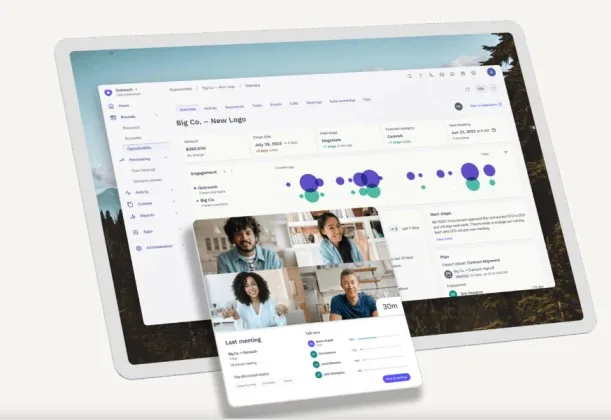
Slack – It’s a popular collaboration and communication platform for enhancing the teamwork and productivity of sales teams. From instant messaging to video calls, file sharing, and cross-tool integrations, Slack offers some really useful features for collaboration. Using this team, faster sales cycles can happen through quick sharing of updates, and resolving issues.
4. Sales Analytics Tools
Sales analytics tools are important when businesses aim to harness the power of data and make smarter decisions. These tools help analyze sales data, trends, and patterns. Sales teams can rely on these tools to track evaluate and manage the performance of sales strategies and activities on any scale. When analytics tools are used, the need for manually gathering data through spreadsheets is left redundant, resulting in improved efficiency in sales reporting.
Using sales analytics tools, your business can achieve a variety of goals –
- Track and monitor sales performance in real-time
- Analyze key sales metrics such as conversion rates, sales revenue, and sales cycle growth
- Use predictive analytics for forecasting future sales trends and outcomes
- Optimize sales processes and improve lead qualification processes
- Gain valuable insights into customer behavior and sales preferences
Two of the popular tools of this category include –
Power BI – It’s a popular business analytics tool to visualize and analyze sales data in real-time. Using this tool developed by Microsoft, sales teams can track sales performance and gain deep insights into customer behavior. Some of the key features of Power BI include interactive insights, AI-enabled insights, and data modeling. It can be integrated with various data sources, making it a top tool for sales analytics.
Tableau – It’s one of the best data visualization and analytics tools to gain actionable insights from sales data. Using Tableau, sales teams can visualize trends and identify patterns, resulting in improved data-driven decisions. Key features of the tool include machine learning, predictive analytics, and quick dashboard creation. This tool easily integrates with Salesforce CRM which helps businesses use their existing data and improve sales performance.
5. B2B Sales Tools
B2B sales tools are vital for businesses looking to optimize their sales processes and boost revenue growth. These tools provide the resources, insights, and capabilities to sales teams. Using these tools, teams can automate tasks, streamline workflows, and increase the number of sales activities. What’s more, sales tools are not only essential for driving customer-centric sales but also for managing vast amounts of customer data.
Using B2B sales tools, businesses can perform a variety of sales tasks smoothly –
- Easy access to up-to-date information on customer contacts and sales
- Get advanced analytics and reporting capabilities to gauge sales performance
- Identify sales trends and optimize sales strategies for better results
- Collaborate and communicate with team members and across departments
Two of the popular tools of this category include –
Lusha Extension – B2B sales professionals would love this tool because it helps them enhance their lead generation efforts and boost overall sales productivity. Lusha Extension provides accurate contact information and potential lead data related to decision-makers. Sales teams can use it to identify and connect with influencers. It’s a powerful sales Chrome extension that can help you find anyone on LinkedIn.
Calendly – It’s a free B2B sales tool that makes appointment scheduling as hassle-free as it should be. Calendly can simplify the process of scheduling meetings and appointments, saving precious time for sales teams. It also eliminates the need for back-and-forth email exchanges or calls. If you want to say goodbye to manual scheduling and improve the sales process, this tool is fit for you.
6. B2C Sales Tools
These tools are used to enhance customer engagement and optimize sales processes. Using B2C sales tools, sales processes can be streamlined, and repetitive tasks can be automated, resulting in better customer experiences and improved sales. They are also helpful for getting valuable insights into customer behavior and market trends. Using B2C sales tools, it becomes easy to identify opportunities for sales growth and make data-driven marketing decisions.
Using B2C sales, your business can perform a variety of tasks –
- Engage with customers across channels and improve their experiences with your brand
- Interact with customers in real-time and address their concerns
- Identify opportunities for upselling and cross-selling
- Automate marketing campaigns and drive conversions
- Provide timely and responsive support to customers and encourage repeat purchases
Two of the popular tools of this category include –
Mailchimp – This tool is a top choice for B2C sales professionals as it provides a range of features for marketing automation. Using Mailchimp, a business can engage with customers through email and social media marketing. From creating personalized campaigns to tracking customer interactions, it allows every task related to marketing. More so, it offers robust analytics and helps analyze campaign performance.
Klaviyo – It’s another popular B2B sales tool that helps create personalized customer experiences across channels, including email and SMS. More so, it offers real-time data and AI-driven insights. You can also integrate Klaviyo with popular e-commerce platforms like Magento, Shopify, WooCommerce, and Magento. This enables the creation of personalized email campaigns and customer segmentation.
7. Sales Enablement Tools
Sales enablement tools are important when businesses look to enhance sales efficiency and drive revenue. These tools have features to streamline content management, analytics, and training. More so, they help align marketing and sales efforts, providing key insights for data-driven decisions. Using these tools can enhance the productivity and effectiveness of sales teams. The various functionalities they provide can empower sales teams and help them close deals more efficiently.
Using sales enablement tools, a variety of tasks can be performed –
- Sales processes can be streamlined by reducing manual effort
- Tasks such as follow-up emails and data entry can be automated
- Better collaboration and communication become possible among team members
- Sales teams can benefit from CRM integration and shared document repositories
- You can get valuable insights and analytics, and track key performance metrics
Two of the popular tools of this category include –
Seismic – It’s a powerful sales enablement platform with a comprehensive suite of tools and features for sales teams. Using Seismic, the sales team can feel more empowered and its productivity can be boosted. From resources, and insights to capabilities, it offers every tool for driving engagement and winning more leads. Some of the key features include content management, sales enablement automation, analytics, and integration with CRM and other systems.
Highspot – It’s another popular sales enablement tool that offers a wide range of features to drive engagement and ensure better results. Highspot provides content management features and also allows sales teams to personalize sales content based on the specific needs and buying stages of an individual prospect. Some other key features include content analytics, content insights, and sales content recommendations.
8. Sales Intelligence Tools
Sales intelligence tools are useful for getting valuable insights into customer behavior, needs, and preferences. They help analyze customer analytics and data on any scale, resulting in a deep understanding of the audience. More so, they also help in the identification of potential sales opportunities and the analysis of market trends and industry data. By using sales intelligence tools, leads can be prioritized and sales pitches can be personalized. Some of the other key features include streamlining sales processes, enhancing sales forecasting, etc.
Using sales intelligence tools, businesses can perform a variety of tasks –
- Automate various sales processes such as lead nurturing and lead scoring
- Streamline sales workflow and improve efficiency
- Forecast sales more accurately by evaluating market trends and historical data
- Get information about future sales opportunities and challenges
Two of the popular tools of this category include –
ZoomInfo – It’s a powerful sales intelligence tool providing access to a vast database of contacts and company information. Using ZoomInfo, sales teams can build highly targeted prospect lists and customize their outreach efforts. More so, it also offers features to prioritize leads based on real-time data on buying signals. Its advanced search and filtering capabilities are very helpful for identifying ideal prospects. Sales teams can also integrate it with CRM systems and enjoy seamless data management.
Clearbit – It’s a useful tool for the sales team looking to enhance lead data quality and find actionable insights. Clearbit is also used for segmenting leads based on behavioral attitudes. Businesses can leverage its lead generation and data enrichment features. What’s more, it provides API integrations that can help enrich CRM data and personalize sales campaigns. It can also be integrated with marketing automation platforms to ensure seamless data enrichment and lead scoring.
Leverage REVE’s Engagement Tools and Drive Your Sales
Engagement is always at the heart of sales. The better you engage with your customers, the more positive impact it will have on your sales conversion.
At REVE Chat, we understand how engaging with your customers better can positively affect your bottom line. That’s why we offer a wide range of tools to interact and engage with your customers across channels.
You can use our AI-powered chatbot to automate tasks across sales, marketing, and support together with offering quick replies to customer queries.
We also have tools such as video chat software and co-browsing tools for making engagement more interactive with your customers.
Our chatbot can be added to the live chat software to change the way you provide support.
Final Thoughts
Sales teams feel motivated and empowered when they have the right tools at their disposal. Such tools add to their productivity and efficiency levels, resulting in more sales and revenue for your business.
With REVE Chat, you can find a variety of tools to converse, interact, and engage with your customers better. This will pave the way for more sales.
So, you can sign up with us and check how our tools can add value to different aspects of your business operations.

